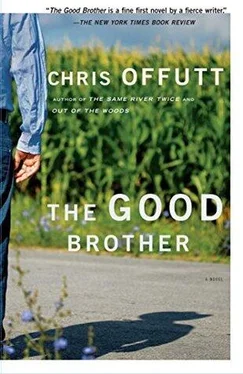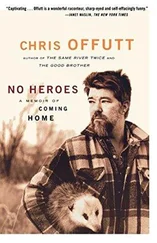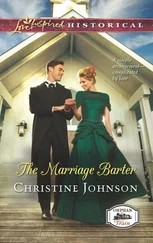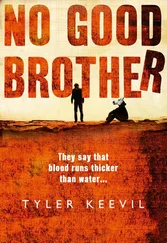“A trophy possum. There’s something I’d like to see.”
Arlow stomped the brake pedal and the tires squealed. Virgil lost his beer. His forearms hit the dashboard and he could feel debris from under the seat bounce against his boots. The truck stopped sideways in the road. Arlow was standing on the brake pedal, his body arched over the steering wheel.
“That makes my pecker hard,” Arlow said. “Don’t it you?”
He spun the car around and headed the way they’d come.
“We ain’t going to town, are we,” Virgil said.
“I thought you wanted to see a stuffed possum.”
“Where’s it at?”
“Third hollow past the next wide place. We’ll go see old man Morgan. You know him?”
“I’ve heard tell.”
They turned onto a dirt road that forked several times and narrowed to one lane with weeds growing in the middle. Tree limbs laced overhead, blotting stars and moon. There was no ditch. The wooded hills slanted into the sky on both sides of the road. Arlow pumped the clutch for traction.
“Got to keep her in Granny gear,” he said.
The hollow tightened until the road became a path and the rear tires spun. Arlow cut the engine and honked the horn twice, the sound hanging in the darkness. They left the truck and walked the path. Branches snagged their clothes. The hum of locust filled the air, rising and falling at different intervals, surrounding them but always at a distance. The path opened into a clearing where the dark shape of a house sat among white oaks. A glow of light came from a window.
“Hey, Morgan,” Arlow yelled. “It’s Catfish Atkins’ boy, Arlow. I got a buddy here, but I’m coming up by myself.” He turned to Virgil and spoke in a normal voice. “Stay here a minute. He’s bad to be squirrelly.”
He crossed the glade and yelled again before stepping on the porch and into the house. Virgil didn’t feel drunk but knew he was. The whisky kept him awake and gave his mind a clarity that he enjoyed.
Arlow yelled through the night and Virgil walked up the slope. The back of the house was tucked tight to the hillside while the front porch was supported by stacked rock. Virgil climbed uneven steps to the porch. The door hung at a tilt from a broken hinge. An old man sat by a cold woodstove. He held a knife in one hand and a small piece of wood in the other. Crescents of shaved wood covered his lap.
“Hidy, by God,” he said. “Whose boy are you?”
“Darly Caudill’s second boy, Virgil.”
“Best tell me your papaw, then. They’s more Caudills than dogs in these parts.”
“Zale.”
“Did he marry Augselle Sparks from up on Clay Creek?”
“Yup.”
“Shoot, I know your whole line. Set yourself down. I been low in my gears and can’t get up. I heard you’uns coming a mile away. Sound moves up here like a tunnel. This holler’s so narrow I got to break day with a hammer.”
Virgil sat on an ancient crate turned black from handling. Arlow turned a metal kitchen chair backwards so that his forearms rested on its laddered back. The man’s knife blade flashed like a bird’s beak in a corn crib. His face was brown and there were bugs in his hair.
When he finished working, he stropped his knife on a boot heel and put it away. He held a piece of wood that was two inches long and a half inch wide, the long end tapered like the bill of a duck. The other end was fat and blunt, with a notch to one side. It resembled the triggering device to a homemade rabbit trap. He passed it to Virgil.
“I’ll give you it if you can call it true.” Morgan said.
“Some kind of hook.”
“No.”
“Whistle.”
“Ain’t got no blower to her.”
No matter how Virgil turned the wood, it looked like a piece of scrap that somebody had whittled to pass the time.
“It ain’t nothing,” he said.
“Sure it is. Let me see your belt a minute.”
Virgil removed his belt and passed it to Morgan, who slipped the belt’s edge into the notch on the piece of wood. He placed the flat end of the wood on the tip of his forefinger. He didn’t hold the wood, but let it extend from his hand like a claw. It should have fallen to the earth, yet it remained in space, the leather curling like a locust seed-pod. He lifted the belt from the notch and the little piece of wood dropped to the ground.
“What is it?” Virgil said.
“Belt balancer.”
“What’s it do?”
“Balances belts.”
“How’s it work?”
“Just like that. You keep it.”
Virgil slipped the piece of wood in his pocket and ran his belt through the loops. His mouth was dry.
“Tell me something that ain’t true,” Morgan said. “I’d whole lot rather a man lie to me than tell the truth. Know why?”
Virgil shook his head.
“Makes a man feel good to lie.”
“Well,” Virgil said.
“Ain’t everybody who can help a man feel good about hisself. So let me hear a lie.”
“I ain’t drunk,” Virgil said.
The old man leaned back and laughed. Virgil offered the half-pint.
“Ain’t much of a drinker, are ye. Still yet got the lid.”
He unscrewed the lid and tossed it on the floor.
“Never did like brown. Ain’t got the kick of white. Old boy I used to know ran liquor that you’d better be standing on level ground to drink.”
He tipped his head and trickled the liquor in his mouth. His eyes were closed. He didn’t swallow for nearly a minute. His Adam’s apple worked and he opened his eyes.
“Boys,” he said. “I used to have blue eyes and a red dick. Now I got red eyes and a blue dick.”
Morgan passed the bottle to Virgil and placed his hands on the chair arms as if they were tools stored on a shelf. His ears and nose were long. Behind him, a plank bookshelf held several tiny pieces of carved wood.
“How come you never went to bigger whittling?” Virgil said.
“Ain’t got the learning. I know a half-inch and a quarter, but not no more. Got to eyeball it after that.”
“Nothing to it,” Virgil said. “Just keep cutting each measure in half. Split a quarter and you got eighths. Half that is sixteenths.”
Morgan’s shoulders rose and fell.
“Can’t get her,” he said. “Just can’t.”
“Where’s old Duke at?” Arlow said.
“Got murdered,” Morgan said.
“Why that dog wouldn’t bite a biscuit. Who’d kill it?”
“Red Stumper done it.”
“You aim to do anything?”
“Kill his dog back, I reckon.”
“He ain’t got one,” Arlow said.
“What kind of man don’t keep a dog?”
“Kind that shoots them, I guess.”
“What’s he got? Rooster? Billy goat?”
“Nothing. He lives alone.”
Virgil drank from the bottle. He wasn’t afraid to Mil Rodale, he was afraid of where it might lead. The trouble might run for years and would cease to be specific. The meanest men in both families would continue shooting simply out of habit.
Morgan and Arlow were talking about what kind of winter was ahead and how to read the signs. Boyd never predicted, but accepted each day’s fate. If it rained a week straight, he’d say the water made all the colors brighter. If there was no sun, he’d talk about how much further you could see without the glare. Winter was a good time to learn how the land was made. Virgil wondered what his brother would say about being dead.
“Well,” Boyd might say, “a man ain’t got to worry with warm clothes, eating meals, or getting sleep. Being dead’s freer than when I was living.”
“It ain’t doing me any goddam good,” Virgil said.
“What,” Arlow said.
Virgil blinked at Arlow and Morgan, who were looking at him as if waiting. The room seemed to close in on him.
Читать дальше












